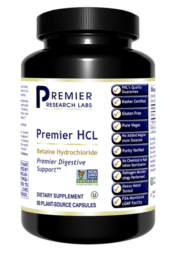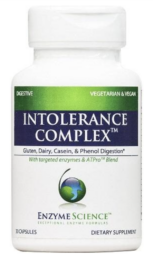
Why is HCl so important?
Are you feeling as if you’re not able to digest the foods you used to love, even indulge in? There’s a reason! The body’s primary digestant and disinfectant is Hydrochloric Acid (HCl). Hydrochloric Acid (HCl) is produced by the stomach and has the job of breaking down proteins. If you make plenty of HCl, then the body can adequately digest protein. If not, protein digestion is compromised. Low HCl signals the beginning of all digestive problems that plague modern man.
Aging and the Modern Diet
When you are young and the stomach is functioning as it should, you produce 3 to 4 quarts of HCl every day. That’s why you used to be able to eat what you wanted without any problems or repercussions. Humans were engineered for raw food which takes very little HCl and enzymes to digest. The problem is that we primarily eat cooked food which is difficult to digest. Over time, constantly eating cooked food taxes our ability to make adequate HCl. Proteins are only partially digested and food begins to sit in the stomach longer than it should. As opposed to being digested, the food is rotting and forming gas.
Heartburn and Worse
When food rots in the stomach, it forms lactic acid. Lactic acid burns and inflames the stomach. If the stomach is in poor shape and the esophageal sphincter weakens over time, the lactic acid can rise up into the lower esophagus and cause what is known as heartburn. This painful condition compels the sufferer to reach for quick relief such as Pepcid AC, Nexium or Prevacid. Just remember, you’re not suffering because you made too much HCl. You’re suffering because food is rotting in the stomach due to poor HCl production.
These compounds alkalize the stomach contents causing the stomach to reflexively open the pyloric valve and drop the undigested, alkaline stomach contents into the small intestine. Not only are the proteins not broken down, but the food has not been sterilized. Remember, HCl is your body’s primary disinfectant. HCl drenches the stomach contents in an acid bath which kills all harmful bacteria in the food. Now you’ve got undigested, bacteria-laden and highly alkaline food sitting in the small intestine. All kinds of digestive problems result from this situation.
What to Eat and What to Avoid
Let’s look at supporting the stomach and making sure these problems don’t occur. Remember, as goes the stomach, so goes you. First, try to put more raw food into your diet. Most of us can handle veggies, so add more of them to the menu. Stay away from the glutenous grains like wheat, barley, rye and oats. They are very hard to digest and contain gluten, which is a known allergen and irritant. Try to avoid pasteurized milk and other dairy products. They are not only toxic, but difficult to digest and form mucus in the digestive tract. Almond milk works well as a substitute. If you must have dairy, make sure it is in the form of an aged cheese or kefir. There are lots of food items on the “easy to digest” menu. Do some research and learn yourself what is out there. Most importantly, make the changes necessary for good digestion. A poorly functioning digestive system paves the way for all the bad things to happen to the body. It’s much easier to break down the body than it is to build it back up.
Supplement Support
Finally, look at taking a few digestive enzyme capsules about 20 minutes before each meal. Using them will help ease the burden on your stomach and pancreas. Take 2 to 4 capsules of HCl following each meal. This is a powerful and inexpensive way to support good digestion. There are also some great “all in one” digestive formulations out there to choose from. These contain both HCl and digestive enzymes in the same formula. I can tell you that Peoples has the best selection of digestive support solutions on the market. You also can get some good advice from the folks working the floor when you come in. If your problems are of an advanced nature, we have practitioners for you to work with. No matter how you go about it, achieving proper digestion should be your first priority.
by Ken Morgan



